Thank you, President Allen
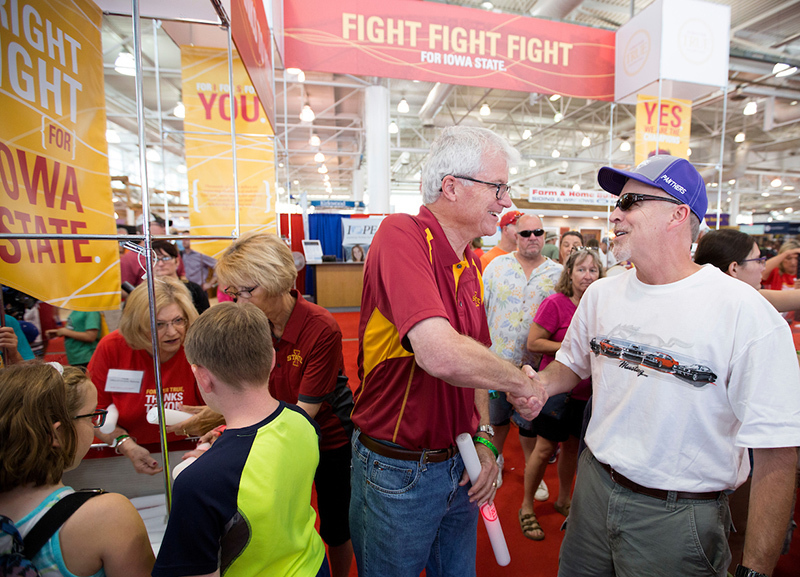
Interim President Ben Allen and his wife, Pat (behind Allen) greeted visitors to Iowa State's main exhibit at the State Fair in August. In the front page image, the Allens welcomed members of this year's President's Leadership Class to the Knoll for their first gathering. Photos by Christopher Gannon.
Ben Allen's 195th -- and final -- day as Iowa State interim president will come this weekend during the fall break. Shortly after, he and his wife, Pat, will quietly, and perhaps gleefully, return to St. Louis to resume their interrupted retirement.
Allen arrived on campus three weeks early last spring, to do his homework and seek out dozens of Iowa Staters for conversations and a smooth transition to May 9, his first official day.
From the beginning, he said he would do his best to make decisions on items that couldn't wait but recognize those that would be better left for the next president, Wendy Wintersteen. Allen pledged to not be a passive interim president, and he delivered. Among the many university accomplishments during his watch were:
- A fiscal year 2018 budget that absorbed another reduction in state support
- A five-year tuition proposal to maintain quality and scale key aspects -- faculty and staff numbers, student financial aid, building capacity -- to catch up with a decade of growth
- A fall student body of 36,321, including 30 in the Allens' President Leadership Class, and dozens of new faculty and staff
- A capital campaign that kept humming, including $145 million and $50 million gifts for permanent endowed funds in the colleges of Liberal Arts and Sciences and Business, respectively; and three gifts totaling $14 million toward a $21 million feed mill and grain science complex in the College of Agriculture and Life Sciences
- Efforts to nurture a welcoming campus environment in the wake of hateful or violent national events
- Big 12 Conference and NCAA Midwest regional titles for both the Cyclone men's and women's cross-country teams, an unprecedented four-win October for the football squad and Top-25 status for the volleyball team
Momentum, ambitions grow for Iowa State startups
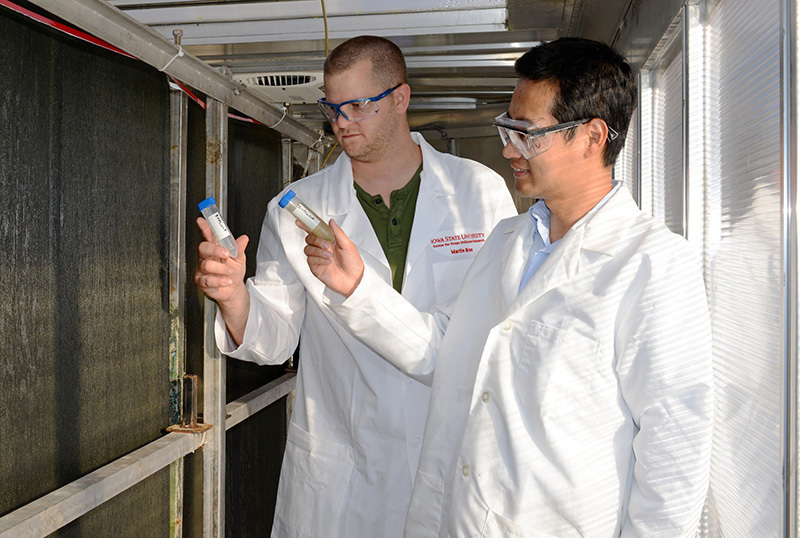
Martin Gross, left, and Zhiyou Wen invented a better way to cultivate algae. Iowa State's Startup Factory program helped them find a better way to sell the technology as a sewage treatment method. Submitted photo.
Martin Gross and Zhiyou Wen knew a lot about algae but little about business.
Gross, a postdoctoral researcher, and Wen, professor of food science and human nutrition, invented a cost-effective way to cultivate algae, which has many industrial uses. But they struggled to find funding or customers for the company they formed. Over five years, they applied unsuccessfully for seven Small Business Innovation Research (SBIR) grants, a competitive federal funding program for startups.
"We're scientists and engineers. We weren't trained in business," Gross said. "We knew what the technology does, but we didn't know what the customer wants. Or even how to get ahold of them."
In 2016, Gross-Wen Technologies was in the first cohort of the Startup Factory, a yearlong business accelerator program in Iowa State's office of economic development and industry relations. The Startup Factory's president, Bill Adamowski, had some tips on their pitch.
"You're not algae guys. You guys are a wastewater treatment company that happens to use algae. If someone in the crowd wants to go into algae talk with you all day long, go for it. But your value proposition is cleaning water," Adamowski recalled telling them.
Since then, Gross-Wen has gone three-for-three on SBIR applications, grants worth a combined $800,000.
"I think our ideas were always good, but we didn't have the commercialization," Gross said.
That gulf between academia and the business world is a common obstacle to university research producing private enterprise. Scientists and scholars who break new ground often don't have the time, means or inclination to market their innovations. Students and young alumni inspired to take the leap often don't have the connections, experience or cash.
In hopes of becoming a company creation hotbed, Iowa State is bridging those divides with an aggressive expansion of programs to help faculty, staff, alumni and students build startups. The push has yielded dividends and could grow even further under President-select Wendy Wintersteen, who has called for a bigger focus on entrepreneurship across the university.
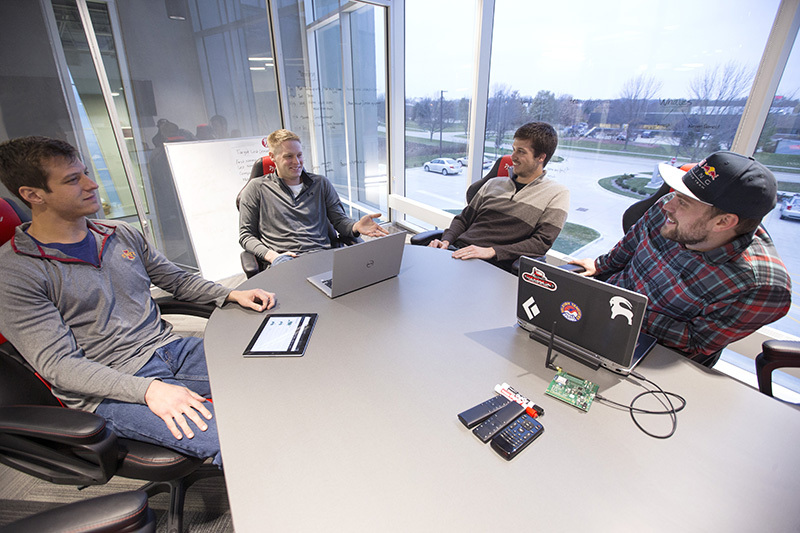
Colin Hurd, second from left, meets with some of his colleagues at SmartAg, which sells technology that lets farmers make some of their field machines driverless. Seated from left are Andrew Johnson, Hurd, Paul Hovey and Quincy Milloy. Photo by Christopher Gannon.
Improving climate
In addition to the Startup Factory, there's a summer program helping students build their businesses, a university-facilitated group of private investors plowing seed money into agricultural startups and a federal grant for testing the commercial possibilities of faculty research -- all new within the last two years, initiatives that are complementary but decentralized.
"I think there's a lot of positive energy going on," said Colin Hurd, who was in the Startup Factory's first cohort and was followed by two of his brothers -- one each in the next two groups.
Hurd's SmartAg agricultural automation company wasn't his first go at an ag-based startup. His initial try began in 2013, aiming to easily till compaction left by field machinery tire tracks. Three years later when he founded SmartAg, Iowa State's startup sustenance had blossomed.
"The difference between now and then is pretty drastic," he said. "The Startup Factory introduced me to some valuable people. I had something of an existing network, but it helped expand that."
Size matters. What makes an environment ripe for entrepreneurship is entrepreneurs, said Kevin Kimle, director of the Agricultural Entrepreneurship Initiative in the College of Agriculture and Life Sciences. More founders growing more companies means more mentors, more investor attention and more examples to inspire the like-minded.
"It just becomes a really powerful thing from a momentum perspective," said Kimle, the Bruce Rastetter Chair in Agricultural Entrepreneurship.
More is Adamowski's goal, too. He wants the Startup Factory to generate 20 new businesses a year. That would establish the university as one of the nation's top five startup schools and the best in the Midwest, he said.
"If we're going to create a culture change here at Iowa State, my thought was we didn't want to come in and say, 'We want to be incrementally better than last year.' There's just no fun or interest in that. The key is 'let's go,'" he said.
So far, it's working. The Startup Factory, which in July welcomed its third cohort in a year, helped the Office of Intellectual Property and Technology Transfer and the ISU Research Foundation license a record 10 startups in fiscal year 2017, executive director Lisa Lorenzen told the state Board of Regents last month. The first two cohorts have created nearly 50 jobs and secured about $5.5 million in outside funding, she said.
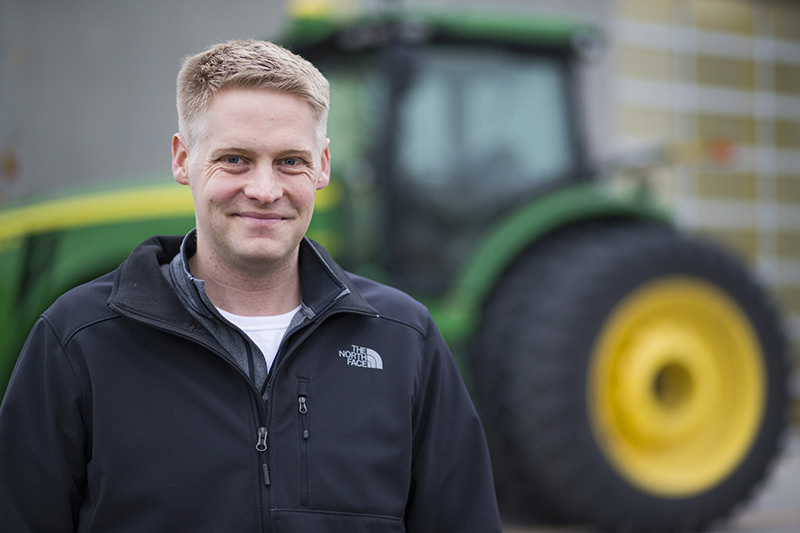
Colin Hurd, founder of SmartAg, which sells technology that lets farmers make some of their field machines driverless. Photo by Christopher Gannon.
Factory for founders
The first half of the Startup Factory's yearlong program is a formal crash course in business development, with a rotating group of volunteer entrepreneurs delivering weekly lessons on legal, financial, marketing, digital and sales issues. The less-structured second 26 weeks is about getting the startup off the launch pad. Depending on individual needs, founders might be working on their pitch or pursuing investors and customers.
After their year is up, companies still can base their operations in the Startup Factory offices on the second floor of the ISU Research Park's Vermeer Applied Technology Hub. Three dozen businesses have participated in the program, which will launch its fourth cohort in January.
Most of the startups are science-based, trying to get from the lab to the boardroom. In selecting participants, the preference is for "big ideas, big problems, things that need capital," Adamowski said. Postdocs, graduate students and recent graduates are often at the helm, as leading a company requires a full-time commitment faculty can't provide.
"If you're not serious about it, this program's not for you," he said.
The program is meant to be a "third founder" of sorts, providing the skills a company's creators may lack, he said. Instead of, say, providing a founder with a list of lawyers to call for legal advice, the Startup Factory sets up the meeting. Or it can help land those crucial first customers, before a company has a track record. It's like having an experienced executive on the management team, without giving up any equity.
Another benefit of the program is the entrepreneurs who serve as teachers, said Adamowksi, who visited and studied numerous other university-based startup incubators before launching Iowa State's. He patterned the use of outside experts off Stanford University, where Silicon Valley innovators and investors are frequent instructors.
The mentorship is valuable, sometimes literally. Dave Furbush, founder of a Des Moines management consultancy, became aware of Gross-Wen while volunteering with the Startup Factory and invested $225,000.
"You want those kinds of people hanging out by the program," Adamowski said.
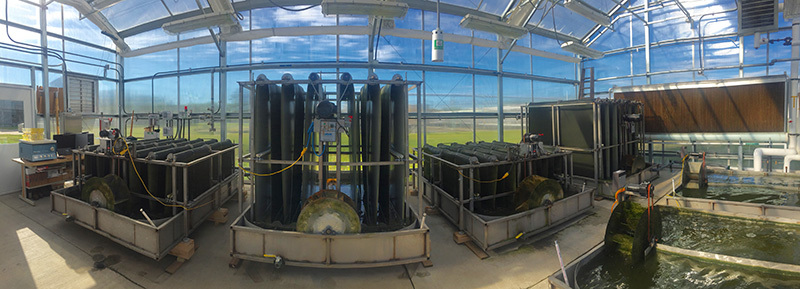
A pilot facility in Chicago testing the wastewater treatment technology invented by Martin Gross and Zhiyou Wen, based on discoveries they made at Iowa State. Submitted photo.
Building a pipeline
The new business-building initiatives are meant to assist all walks of Iowa Staters, from freshmen to faculty.
"It's a pipeline that we're working to build," said Michael Crum, vice president for economic development and industry relations (EDIR).
The earliest-stage accelerator in the continuum is CYstarters, which pays students or recent grads a stipend to work on their business idea for 10 weeks during the summer. Two cohorts have been through the program, which is run by Diana Wright, marketing and program coordinator for the university's Pappajohn Center for Entrepreneurship.
Wright studied entrepreneurship as an Iowa State undergraduate and worked for a startup for two years after graduating. She returned to Iowa State in 2015 as a staffer.
"I got to create the program I wished existed when I was here," she said.
Wright likens CYstarters to an internship at the student's own company. It provides time, funding and guidance, all crucial for nurturing fledgling companies. Plus, the student CEOs have benefited from each other's varying skill sets, she said. A mechanical engineer might help with another team's prototype, while coders and designers can pitch in on app and website issues.
"That just kind of happened. We didn't necessarily plan that," she said, adding: "A lot of times, entrepreneurship is kind of lonely."
Entrepreneurship also can be risky, more so for students who have strong job options, Kimle said. Last year, the Agricultural Entrepreneurship Initiative helped organize the Ag Startup Engine, a private-sector group of investors that funds innovative ag-tech ventures with Iowa State ties. For a recent grad deciding whether to develop or desert a promising enterprise, that might mean having rent money.
"It gives them a plausible explanation to their parents for why they turned down a job," Kimle said.
The group of nine investors has funded five companies, four of them from the Startup Factory -- including SmartAg and Gross-Wen. It plans to invest in 10 more.
Hurd said the $50,000 Ag Startup Engine investment in SmartAg is one reason his second business is thriving more than his first.
"I haven't had to give away half the company right away," he said.
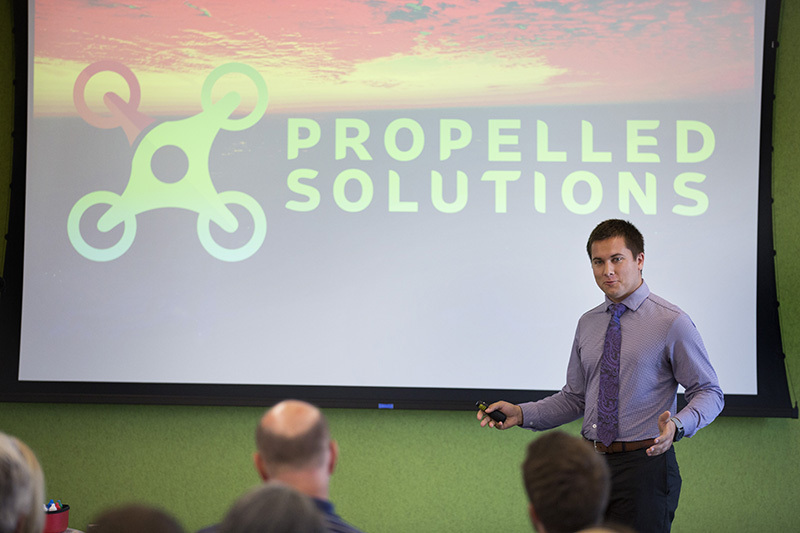
Nolan Herlocker of Cedar Rapids delivers a presentation on his business, Propelled Solutions, at the CYstarters finale event July 28, at the ISU Economic Development Core Facility. Photo by Christopher Gannon.
Capturing 'mindshare'
Providing supportive programs that connect budding capitalists with investors and mentors is important, but strengthening Iowa State's startup culture also requires the idea of building a business to capture more "mindshare," Adamowski said. Scholars accustomed to securing grants to spread knowledge via publication may not consider their work's commercial impact.
"How do you convince faculty members that startups are interesting? That's a big piece of it," Adamowski said. "If there's an interest, they need to know there's a path."
A new federal grant is helping smooth that path. The National Science Foundation earlier this year named Iowa State an Innovation Corps site, a program designed to shepherd NSF-funded research into the marketplace. Thirty Iowa State teams per year will receive $3,000 micro-grants to discover potential customers. The first group is going through the program, and applications for the spring group are being accepted until Jan. 31, 2018.
"It's to tip the toe in there," said Adamowski, the co-principal investigator on the grant along with fellow EDIR program manager Kristine Johansen. "We live in a society where failure is shunned. Startups are about trying stuff, and sometimes it doesn't work."
Each Innovation Corps team has a graduate student or postdoc as the business lead, an entrepreneur as a mentor and a faculty member whose research is being explored. That dynamic is how university research typically comes to market, Adamowski said: Faculty do the research, with a member of their team stepping forward to run the company.
Research discovered on campus is owned by the university, which licenses the technology back to the startup. Faculty involved in the research may receive royalties, Adamowski said. A startup can't use university resources for free, one of many conflict of interest considerations.
"There are processes in place to make sure everything falls into the right realm," Adamowski said, noting that having clear intellectual property rights is important to investors. "Clean deals are the best all the way around."
Charting the future
The future for Iowa State startups may be even brighter under President-select Wintersteen, who in her public forum as a finalist placed a major emphasis on entrepreneurship. It's been a highlight in the College of Agriculture and Life Sciences, where she has been dean since 2006.
That college has the steadiest flow of serious startups, Adamowski said. That may have to do with the business lessons that come with farming, which many ag students are exposed to at a young age, Kimle said.
"By nature, in agriculture, a lot of people have very hands-on experiences," Kimle said.
But Adamowski has been recruiting more ideas from other Iowa State colleges, Engineering and Design in particular. He's also hoping to make it easier in some way to tap into the university's alumni base in search of startup investment. Wright is looking at ways to encourage more women and people of color to start companies.
"You don't want the chips to just fall where they fall," Adamowski said. "If you're creating a culture of change, you can't look at it that way."
The Startup Factory is hoping to take that culture change statewide. The program received a $200,000 state grant earlier this year to expand to four other sites across Iowa, in partnership with community colleges and private universities.
"That's the part I like about it. Getting explorers to commit," Adamowski said.
Senate resumes business with proposed new degrees
Meeting coverage
- Inside Iowa State summaries (2016-present)
- Twitter (@InsideIowaState)
The Faculty Senate resumed its regular schedule Nov. 14 after last month's meeting was canceled due to a conflict with a presidential open forum.
Senators reviewed four new business items, including three proposed academic programs:
- A minor in textile design, a cross-disciplinary effort by the art and visual culture, and apparel, events and hospitality management departments
- A Bachelor of Science in actuarial science, offered by the College of Business in partnership with the College of Liberal Arts and Sciences' math and statistics departments
- A Bachelor of Science in data science, offered by the College of Liberal Arts and Sciences
The faculty development and administrative relations council proposed changes to Faculty Handbook language. The updates would add pretenure and nontenure-eligible faculty in the "Unacceptable Performance of Duty" policy (chapter 7.2.2.5.1).
"In the Faculty Handbook, this section appears to only apply to tenured faculty," said council chair Claire Andreasen. "The intent was to include all faculty."
Senators will vote on all four proposals at their Dec. 12 meeting.
Green Dot intro
Jazzmine Brooks, coordinator of ISU's Green Dot violence prevention program in the student wellness office, gave senators an overview of the initiative. She urged faculty to take advantage of workshops, training and toolkits specially designed for their use.
"It's a prevention program addressing things like sexual assault, dating and domestic violence, and stalking. We can bring in conversations on our mental health and talk about sexual harassment and all of those other pieces," Brooks said. "Green Dot specifically helps folks like you to be equipped to talk about these subjects, either actively or passively."
The faculty toolkit (PDF) includes topic suggestions for papers, classroom awareness materials, syllabus statements and extra credit assignments. It also provides tips to help with Green Dot awareness and support, such as endorsements in email signatures.
Unanimous decisions
Senators approved the discontinuation of the Master of Science degree in landscape architecture, a research-based program designed for professionals and international students. The supporting documents cited "lack of interest and enrollment," with no students currently admitted. The College of Design's landscape architecture department will continue to offer its accredited master's degree in landscape architecture.
Senators also approved updated language for the undergraduate U.S. diversity and international perspective requirements. The changes more clearly state the learning outcomes needed -- through courses or alternative academic work -- to satisfy both the U.S. diversity and international perspectives credits required for graduation.
Research compliance committees prepare to launch electronic systems
Several dozen paper forms will become obsolete over the next few years as Iowa State transitions to electronic submission and review systems for research that includes human participants, animal subjects or biohazards. In sum, the university's three compliance committees responsible for such projects complete more than 2,700 transactions annually.
IRBManager is the software chosen for research projects involving human participants, monitored by the university's Institutional Review Board. Faculty researchers have beta-tested it, with positive feedback, said assistant vice president for research Jerry Zamzow. Implementation is on hold, pending some regulatory decisions at the federal level, anticipated in early 2018.
"We want to do one rollout, so we'll wait for the right time," he said.
And training sessions started last week for a-tune software, the product selected for managing proposals to two other research compliance committees, the Institutional Animal Care and Use Committee and the Institutional Biosafety Committee. Several years in the making, Zamzow said his office worked with an a-tune team to customize the software so a proposal to the animal care committee can generate one to the biosafety committee, if desired. Research administrators wanted to minimize the burden a new system initially puts on its users, particularly principal investigators (PIs), he said.
The intent is to create a one-stop shop for PIs and capture all compliance aspects of their research project, including:
- Initial approval of the proposal and subsequent modifications to the research
- Animal orders
- Animal care services and research interventions
- Animal medical records
- Project billing
A-tune also will streamline the efforts of staff members in the offices of responsible research, laboratory animal resources and the attending veterinarian, who work in tandem to ensure that research projects comply with university, state and federal regulations.
"Whether it's biomedical research or a project to observe chipmunks in the wild, there's a huge swath of things that have to be accounted for," Zamzow said. "A-tune won't lessen the work, but it will make our work efficient."
Late to the dance?
Not at all. Zamzow is unabashed about Iowa State still using a paper approval system. Research administration software is expensive -- and many early adopters were not happy with their selections, he noted.
"There still are lots of paper-based systems out there," he said, including at least one institution that returned to paper just weeks into a transition to an expensive electronic system.
"Despite being paper-based, we're quite efficient, compared to others. We want to ensure that efficiency is preserved," he said.
Early in the new year, a-tune will go live. New research proposals will use the online system, and at every project's annual review, Zamzow anticipates it will migrate to the new system.
The power of one
While the university's enterprise software system, Workday, doesn't have a research management component at this time, Zamzow said a long-term goal is to link in when the time is right.
"We look forward to integrating with that system someday -- to fully realize the power of one for Iowa State," he said.
Questions about a-tune or its rollout may be directed to Sarah Kaatz, director of the office for responsible research; Rob Shipley, director of laboratory animal resources; or attending veterinarian Mary Sauer. Questions about IRBManager also may be directed to Kaatz.
Student directory info to be scaled back
Last month, physical addresses were removed from student information displayed publicly in the university's online directory. On Monday, Nov. 20, student contact information -- phone numbers and email addresses -- will be available only to users on the campus network.
"These changes are the culmination of collaborative efforts to increase data security and students' personal safety," said associate dean of students Keith Robinder. "Our primary goals in this project have been to effectively respond to the important concerns raised by students and staff, and maintain a directory that enhances our campus community."
Users with an on-campus IP address will have regular access to student directory listings (name, email, major, classification and phone number), unless individuals have opted to suppress any or all of their information. Nothing will change for faculty and staff who have access to student information in AccessPlus.
Off-campus users no longer will see student phone numbers or email addresses online, but will be able to send emails through a web submission form offered with the directory listings. Iowa Staters who are off campus can log in with their Net-IDs to access student contact information.
RG Express train treks through 'Snow and Ice'
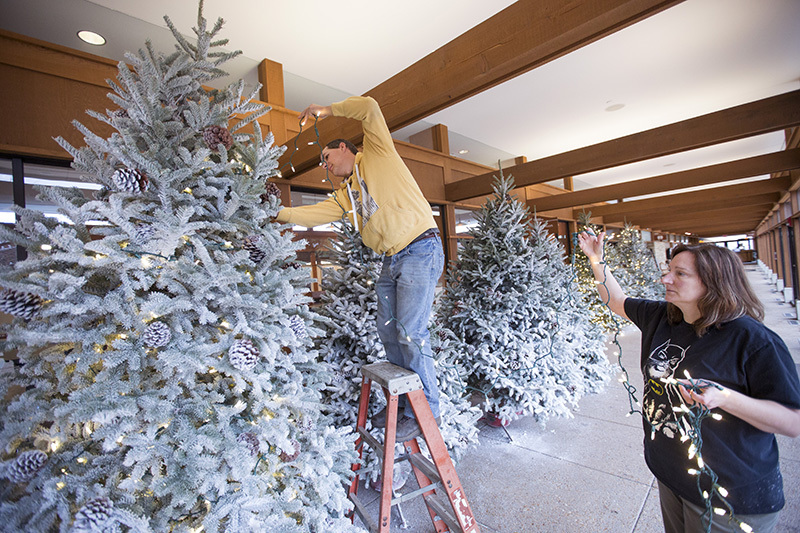
Reiman Gardens volunteers Brenden Johansson (on ladder) and Tracy Stajcar string lights on flocked trees while setting up for the upcoming “Snow and Ice” exhibition. Photo by Christopher Gannon.
Reiman Gardens' staff and volunteers are transforming the conservatory into a winter wonderland for the upcoming "Snow and Ice" exhibition, Nov. 18 through Jan. 6. The event wraps up the gardens' 2017 water theme.
The RG Express holiday train returns for the third time during the exhibition. This year, the G-scale engines and cars will traverse a forest of snow-flocked trees, glistening icicles and snowflakes, and white poinsettias. As in years past, replicas of several Iowa State buildings and landmarks also will dot the landscape, including the Dinkey train, the Hub, campanile (complete with recordings of "The Bells of Iowa State," "ISU Fights" and "Go, Cyclones, Go"), and Beardshear and Morrill halls.
New to this year's display is a replica of the Marston Water Tower, made from natural materials including willow, gourds, bamboo, grapevine curls, pinecone scales, salt cedar twigs, lotus and eucalyptus pods, and sisal roping. The replica was created by Applied Imagination, the same company that constructed the other buildings.
"We wanted to add a new building or structure to our train display to keep it fresh and exciting for visitors," said Maria Teply, communications coordinator at Reiman Gardens. "Since our theme for 2017 is water, we thought it was fitting to do the Marston Water Tower."
Built in 1895, the water tower was the first elevated steel water tower west of the Mississippi River. It's on the National Register of Historic Places and is considered an American Water Landmark by the American Water Works Association.
Reiman Gardens is open daily from 9 a.m. to 4:30 p.m., with extended hours until 8 p.m. each Thursday in December. It is closed on Thanksgiving, Christmas and New Year's days. Admission is $8 ($4 for kids ages 4 to 17; free for kids ages 3 and younger, members and ISU students).
